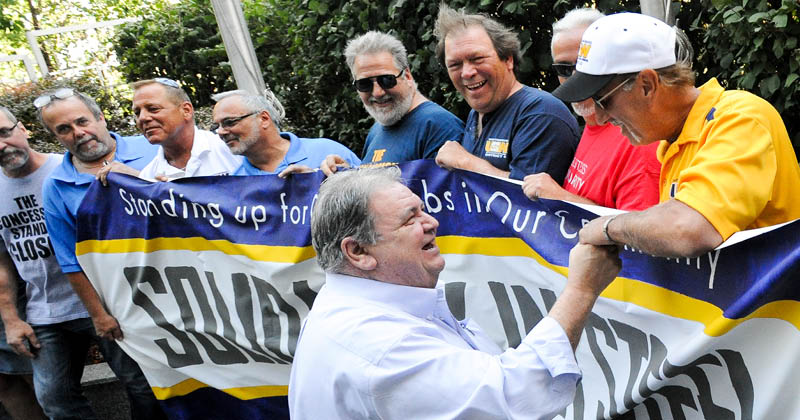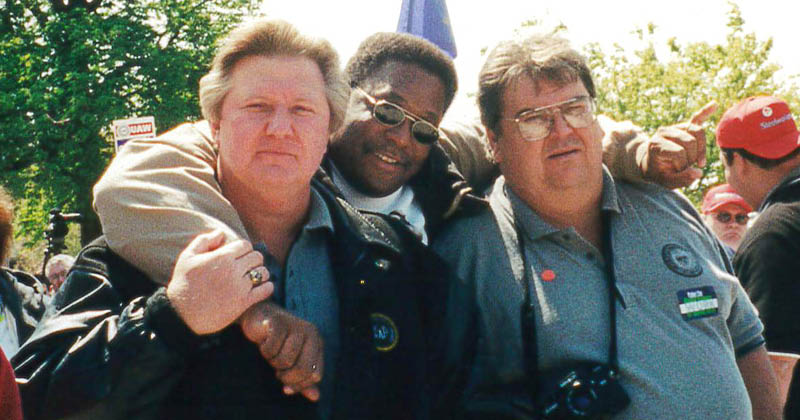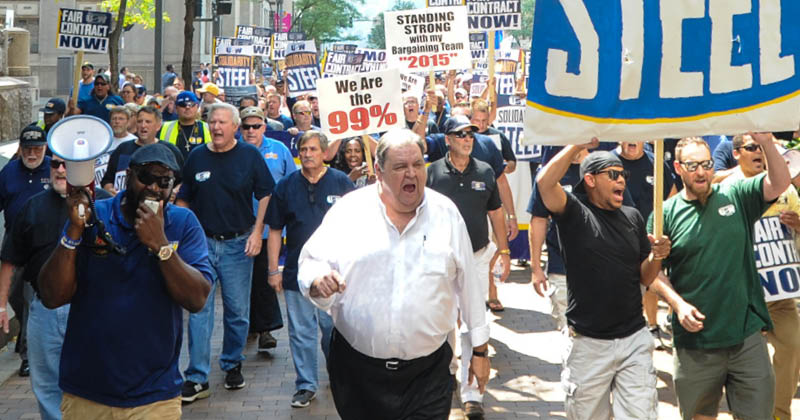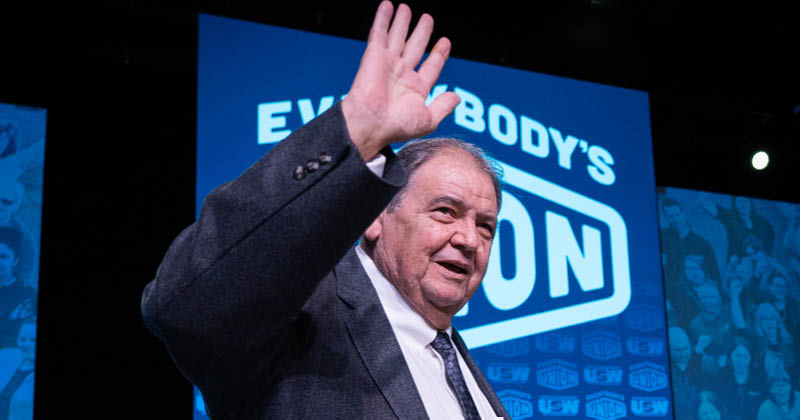USW Mourns Loss of Conway: Steelworkers President Spent 45 Years Fighting for Justice for Workers

International President Tom Conway – who dedicated his life to fighting for USW members and their families at the bargaining table, on the picket line, in the halls of government and anywhere in between – died on Sept. 25, 2023, at the age of 71.
Known for his quick wit, formidable negotiating skills and unwavering devotion to justice and fairness, Conway served as the union’s president since his election in 2019, following 14 years of service as international vice president.
The USW International Executive Board appointed International Vice President David McCall to serve the remainder of Conway’s term.
“From his earliest time making steel to his steady hand leading us through the darkest days of the pandemic, Tom followed two simple guiding principles: the dignity of work and the power of working people,” McCall said. “Tom was never afraid of a fight, and thanks to his ingenuity and determination, generations of workers can enjoy better jobs and brighter futures.”
Outpouring of Sympathy
Conway’s passing sparked an outpouring of grief and condolences for his longtime partner Carol, his three sons and six grandchildren, as well as for the extended family of USW members he worked so closely with for decades.
Celebrations of Conway’s life came from the White House, from the halls of Congress, and from rank-and-file workers in national news reports, on social media accounts and in union halls across the continent.
“American workers have lost an extraordinary champion, and I’ve lost a great friend,” President Joe Biden said of Conway. “He made our nation fairer. He made our nation stronger. And I will miss him dearly.”
Lourenco Goncalves, chairman and CEO of Cleveland-Cliffs Inc., said he considered Conway a friend who shared his vision for the future of American manufacturing.
Goncalves said he and Conway held “a steadfast belief in the bright future of the American industry.”
“Tom recognized that good-paying union jobs are at the core of America’s strength, and was a tireless advocate for the men and women of the United Steelworkers,” he said. “He fought for policies that preserve and grow the middle class. While Cleveland-Cliffs’ close partnership with the USW will continue, I will miss Tom Conway greatly.”
USW Members Mourn
Some of the most heartfelt tributes to Conway came from the USW members whose lives he touched, and who were united in their respect and appreciation for his lifetime of advocacy on their behalf.
Tom O’Shei, president of Local 135L in Buffalo, N.Y., worked with Conway on several difficult rounds of bargaining with Goodyear, including one summer a decade ago when the bargaining committee spent much of their time together in Cincinnati hammering out proposals and learning from each other.

“Tom taught many of us on the committee about negotiating and how to conduct yourself as a union leader,” O’Shei said. “His demeanor was always kind, and he always took the time to talk to members and teach them, or just listen to them. He was definitely one of a kind.”
Steve Ackerman, president of Local 169 in Mansfield, Ohio, said Conway helped members of his local when their former employer, AK Steel, locked them out of their jobs for 39 months.
Ackerman credited Conway and McCall with helping to keep members focused and united during the ordeal, which ultimately ended with their return to work in January 2003.
“President Conway was one of the most fearless, selfless, and courageous leaders that could have led this organization,” Ackerman said.
Health care worker Sarah Hardnett, unit president of Local 9201 at Magnolia Ridge long-term care center in Alabama, said she appreciated Conway’s efforts to champion the issues of workers in her sector.
“He understood the importance of the health care sector, not just to our union but to the country as a whole,” she said. “He valued our Health Care Workers Council and made it a priority to invest time and resources into lifting up our work. Hopefully we honor his legacy moving forward as a council.”
Memorial Service
International Vice President Roxanne Brown was one of eight speakers who celebrated that legacy at a memorial service on Oct. 3 at the international headquarters in Pittsburgh. Brown called Conway a mentor and spoke to the mourners about the many lessons he taught her in their more than 20 years of friendship, the most important being to always make time for family and friends.
“Tom had an outsized impact on so many of the lives in this room and outside this room,” said Brown, who also read a personal letter of sympathy President Biden wrote for the occasion.
It was at the memorial service that many of the hundreds of rank-and-file members in attendance got their first look at the urn that holds Conway’s remains. It was, just as he wished, created by members of his home local, fabricated from steel forged by Local 6787 members at Burns Harbor.
Local President Pete Trinidad Sr. spoke of his and other members’ pride in helping to make that project a reality, recalling his last conversation with Conway and how he never stopped thinking about the well-being of USW members.
“We must exemplify moral courage, personal integrity and goodness,” Trinidad said. “Tom did that all the time while remaining humble and genuine. With all the titles and everything he accomplished in his life, he never ever let it go to his head.”
Diversity Efforts
Ackerman said he admired Conway’s commitment to preparing younger members for leadership roles. Under Conway’s direction, the union held its first international Next Gen conference in November 2019, where he and other top officers participated in a panel discussion with young workers.
“I see our jobs over the next few years to build a succession plan and to build a bench, to bring along young people and give them an opportunity to step forward,” he told the crowd. “We are preparing to turn this union over, and we intend to turn it over to you guys.”
Next Gen was just one of the many ways Conway sought to strengthen the USW during his tenure by bringing a diverse group of voices into the union.
As he said in his keynote speech at the 2022 USW convention, “every worker deserves a seat at the table and the protections of a union contract.”
It was at that same convention that members brought a constitutional amendment to the floor to create Veterans of Steel committees in locals across the union.
From the podium, Conway, himself an Air Force veteran, oversaw a robust discussion of the amendment, which members ultimately ratified.
Mike Budd, a Marine Corps veteran and member of Local 12775, praised Conway’s instrumental role in creating the program, which advocates for legislation benefiting veterans and also provides a support system in every local for union members with military backgrounds.
Budd said about 60 of his co-workers at Northern Indiana Public Service Co. belong to the local’s Vets of Steel chapter, which provides them with a space to discuss the challenges of deployment as well as their struggles on the home front.
“You know the other person would understand your experiences,” Budd said.
Securing Pensions
SOAR President Bill Pienta said Conway never lost sight of the big picture, even when focused on the details of day-to-day contract bargaining.
At the negotiating table, Conway consistently fought to preserve benefits for retirees, and he helped SOAR expand its focus to advocate on behalf of all seniors, Pienta said.
“Tom supported and encouraged that new direction,” Pienta said.
Under Conway’s leadership, USW Rapid Response and SOAR activists achieved a major victory with the passage of the Butch Lewis Act, which saved the pensions of more than one million workers and retirees, including more than 100,000 USW members.
Early Activism
Conway worked alongside McCall in the 1970s and 1980s as a millwright at the Burns Harbor steel facility in Northwest Indiana, and served with him for many years on the international staff.
The pair, born on the same day, were close friends, co-workers and union brothers for 45 years. Conway’s lifetime of union activism began early on, when he led a fight against the company hiring contractors to work at the mill while union members were laid off.
“That got him a lot of notoriety at the plant,” McCall said. “We had hundreds of our guys recalled who had been laid off.”

Skilled Bargainer
As a top USW officer for 18 years, Conway relished going toe to toe with leaders of some of the biggest USW employers. Over the course of his career, he became one of the union’s most accomplished negotiators in steel, rubber, aluminum, oil and other major industries, often directing bargaining during crises.
He led talks with U.S. Steel in 2008, 2012 and 2015, when the industry was on the verge of crisis. In 2018, with the industry improving, USW members under Conway’s leadership successfully fought off demands for cuts and ratified a new four-year agreement covering 16,000 workers that significantly boosted pay and benefits.
Early in his time as an international leader, when workers in the steel industry were facing layoffs and plant closures, Conway was instrumental in developing the Institute for Career Development (ICD), a joint labor-management training program, enshrined in a number of USW collective bargaining agreements, that provides members with opportunities to learn new skills.
Today, 16 employers participate in the ICD program, which offers courses at 65 locations in the steel, tire and rubber, glass, container and utility sectors.
The creation of the ICD was one of many times in which Conway’s ideas and bargaining skills led to groundbreaking agreements that pushed back against companies’ demands for concessions and helped members move forward in unique ways.
In other cases, USW members were forced to take their fights to picket lines.
In 2014, Conway helped to lead thousands of USW oil refinery and petrochemical workers on an unfair labor practice strike against their multi-billion-dollar employers, primarily over the issue of plant safety. It was the largest work stoppage in the industry in three decades and resulted in a new contract that achieved many of the USW’s demands.
In August 2015, Allegheny Technologies Inc. (ATI) locked 2,200 USW members out of their jobs for six months after the company gave the union a long list of deep concessions, which workers rejected.
Conway, who knew that the company’s plan was to “starve out” union workers until they accepted concessions, led USW members to victory in that fight as well, bargaining a contract that avoided most of the company’s demands and that members ratified by a 5-to-1 margin.
As he always did, Conway gave credit for those victories to the solidarity of rank-and-file workers.
“Solidarity wasn’t just a word to Tom; it was a way of life,” said International Secretary-Treasurer John Shinn. “He understood that by working together, we could balance the scales against greedy corporations and the billionaire class.”
Focus on Safety
In addition to strong wages and benefits, Conway consistently fought at the bargaining table for language to ensure safer and healthier workplaces for members.
In the month before his death, he publicly championed new rules to safeguard oil workers in Washington State, promoted legislation to limit excessive overtime in Maine’s paper industry, advocated for minimum staffing levels at nursing homes, and pushed the Mine Safety and Health Administration to protect surface and underground miners from silica dust.
“I cannot express how grateful I am to President Conway and the rest of our union leaders for taking a hard stance and saying enough is enough,” said Marshal Cummings, chief steward and safety committee member for Local 13214, which represents hundreds of miners at the Genesis Alkali trona production complex in Green River, Wyo.
Cummings, who testified on the need for a comprehensive, enforceable silica standard, credited Conway for standing up to mining companies that cut corners on safety and put profits over people.
“Through his advocacy and support, President Conway has had a major role in saving tens of thousands of current and future miners’ lives,” he said.
Ensuring Fair Trade
While he possessed unparalleled bargaining skills, Conway knew that was not the only way union members had to fight for justice. His efforts repeatedly took him to Washington, D.C., where he relentlessly advocated for fair trade rules, safety regulations and other measures to protect workers.
During his 18 years in USW leadership, Conway worked to make sure that the government enforced trade laws to prevent importation of illegally subsidized and dumped products that damage domestic industries and destroy good-paying jobs.

At the same time, he worked not just to save jobs but to create them, finding new ways to engage both companies and elected officials to expand manufacturing, secure the nation’s supply chains and invest in healthy, flourishing communities.
In August 2021, he led the way as USW members embarked on a 2,200-mile “We Supply America” tour through six states and Washington, D.C., holding rallies and other public events along the way, urging Congress and the president to enact a massive plan to rebuild the nation’s infrastructure.
The effort proved successful when, in November of that year, Biden signed the $1.2 trillion Infrastructure Investment and Jobs Act.
Conway knew that healthy domestic industries and profitable companies were good for workers, so he often partnered with willing employers and other organizations to ensure that domestic industries had a sustainable future.
He developed strong working relationships with political leaders, including U.S. Sen. Sherrod Brown of Ohio, who called Conway a “warrior for working people” and said he was one of the people he trusted most on issues of trade and worker health and safety.
In addition to political alliances, Conway made sure the USW built connections with other labor organizations and like-minded groups. He was a driving force behind the creation of the Alliance for American Manufacturing (AAM), a nonprofit union-management partnership, and a founding board member of the labor-environmental partnership the BlueGreen Alliance.
The goal of such initiatives, AAM president Scott Paul said, was “to help shape the future rather than being shaped by the decisions that others were making.”
Organizing Initiative
On the day he took office on July 15, 2019, upon the retirement of then-International President Leo Gerard, Conway pledged to devote the union’s resources to organizing new workers into the labor movement, particularly in the historically non-union southern United States.
“The country is ripe for organizing and we’re going to do it,” he vowed following his installation as president. “We are going to continue to fight, and we are going to continue to win.”
Conway immediately made good on his promise, establishing a member-driven organizing campaign across the continent, through which the USW recruited and trained rank-and-file members to talk to their fellow workers about joining the labor movement.
The initiative quickly paid dividends, resulting in organizing victories in the United States and Canada, including some of the union’s biggest wins in years.
More than 300 workers at the Kumho Tire factory in Macon, Ga., overcame a relentless campaign to join the USW in 2020. Likewise, in October 2021, 3,500 faculty members at the University of Pittsburgh joined the union. Over the past three years, baristas at Starbucks coffee shops across Canada have been voting in large numbers to become USW members. And in May 2023, 1,500 workers at Georgia’s Blue Bird Corp. bus factory voted overwhelmingly to join the USW.
Many others across North America, including waste disposal workers, professional football players, museum and library workers, high-tech workers, airport workers, prison chaplains and others, joined the Steelworkers’ ranks as a result of Conway’s initiative.
“Tom’s legacy will forever remain,” AFL-CIO President Liz Shuler and Secretary-Treasurer Fred Redmond said in a joint statement. “We’ll all continue to learn from his life in service to working people.”
Union Family
It could be said that organizing was in Conway’s DNA. He grew up in a union family in New Jersey. His mother worked at a brush factory, where she successfully organized a union and negotiated labor contracts, and his father was an active member of the International Union of Operating Engineers.
After Conway spent four years in the Air Force and attending trade school for airframe and power plant mechanics, Bethlehem Steel recruited him in 1978 to work at Burns Harbor.
Conway joined the union staff in 1987, serving members at Burns Harbor and other steel facilities and getting involved in national steel bargaining with companies including National Steel, Bethlehem and U.S. Steel.
In 1995, then-International President George Becker appointed Conway as secretary of the Basic Steel Industry Conference, a job in which he was responsible for developing bargaining strategies and directing the union’s trade and legislative efforts. He quickly became one of the USW’s lead voices during turbulent steel cycles for more than two decades.
“We will all miss Tom’s passion, his integrity, his gift for strategy and not least of all, his sense of humor,” said McCall. “His time as USW president was too short, but it’s clear he will leave an indelible impact on our union and beyond.”

By clicking Sign Up you're confirming that you agree with our Terms and Conditions.
Recent News Articles
Want to Learn More?
See how the USW is making a real difference in our communities and our workplaces.
